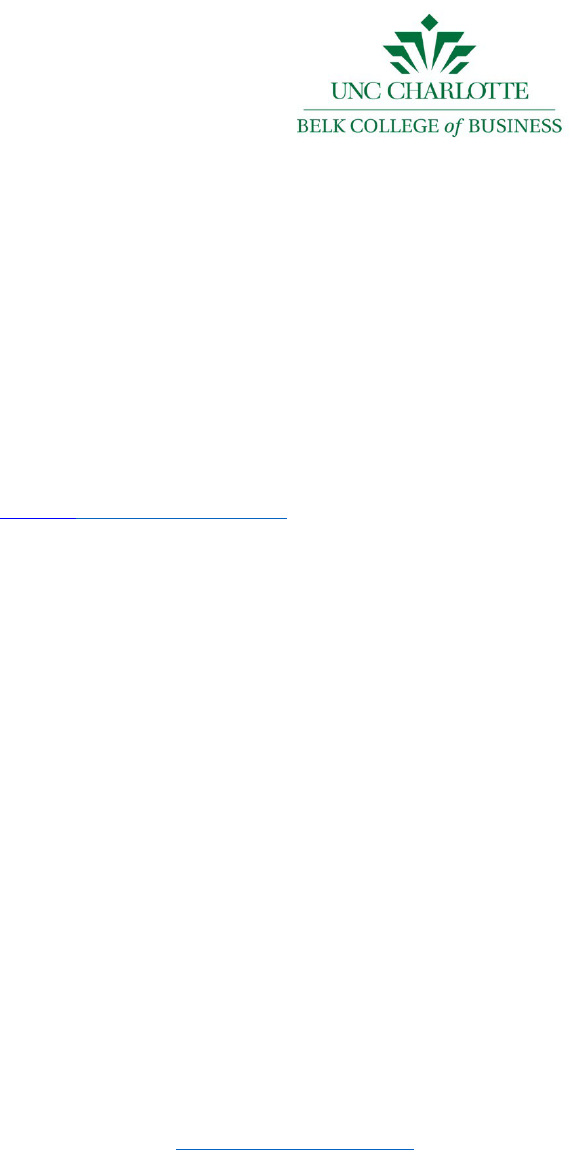
1
Strategic Management Syllabus
MGMT 3280 – Sections 3280 – 005 | 3280 – 007 | 3280 - 090
Fall Semester 2022
Dr. Vijay K. Patel
Contact Information:
Office: 250A Friday Building
Office Hours: Tue/Thurs 11.30 – 12.30 pm
By appointment. Please arrange times after classes and confirm by email. Special times available
whenever possible and necessary.
Phone: 704-687-7607
Email: vijay.patel@uncc.edu – please include Course # and Section # when communicating.
Email is preferred.
MGMT 3280 Schedule and Classroom assignments:
Section 3280 – 005 Friday 112: Schedule: Tue/Thurs – 1.00-2.15 pm |
Section 3280 – 007 Friday 155: Schedule: Tue/Thurs – 4.00-5.15 pm |
Section 3280 – 090 Online : Schedule: Wed – 5:30 – 8:15 pm |
Required Text:
Frank Rothaermel, Strategic Management, 5
th
Edition McGraw-Hill Higher Education, 2021.
ISBN10:126026128X| ISBN13: 9781260261288
Purchase of etext is Mandatory and cost effective. eText will be necessary for accessibility since we will
use this text frequently in class for team based participation and analysis. All students are strongly
advised to make sure they purchase the latest edition. It has substantial contemporary information as
reference. Importantly, it is indispensable for your midterm exams.
You will need to purchase cases from Harvard Business Cases or other designated Case vendors.
Course pack information will be provided. Cases will be chosen based on class interests and profile.
Glo-Bus Simulation Registration:
Every student will need to subscribe to the Globus simulation package. Further information and
resources are available at https://new.glo-bus.com/. You will be provided with a company
registration code by the professor. The Glo-Bus simulation package is designed to provide ‘real life’
decision making and strategy challenges. When available, students find this an outstanding part of
their learning and preparation for their careers. Teams of maximum 5 participants will be assigned
on a random basis. Please understand teamwork is key and as in a corporate environment your
2
teams will be assigned by the supervisor. It is essential for you to learn and execute on the art of
collaboration. High scoring teams consistently excel in the quality of teamwork and collaboration.
Hard work, mutual support, and maturity lead to the best results.
Our university has scored in the Top 100 in a worldwide competition among 300 universities with
around 30,000 students participating. Many of our teams have also achieved Top 10 ranking. Such
performances require commitment, teamwork and diligence.
Suggested Readings and Resources:
All students are expected to stay abreast of contemporary developments and trends in global business.
Some suggested sources include: Forbes, The Wall Street Journal, Financial Times, The Economist,
Fortune, and Bloomberg/Business Week. Please make full use of all available articles/resources from
social media content including YouTube and website resources from UNCC and other major
universities around the globe e.g. IMEDE, LSE, Harvard, MIT and Stanford. Additional materials will
be posted for reference and study as needed. Please note this is a core aspect of your learning to be a
knowledgeable and informed executive.
Course Description:
MGMT 3280: Strategic Management. (3) Prerequisites: Senior standing; BLAW 3150, COMM 3160,
ECON 3125, FINN 3120, INFO 3130, MGMT 3140, MKTG 3110, and OPER 3100. (Accounting majors
are required to take BLAW 3150, COMM 3160, FINN 3120, INFO 3130, MGMT 3140, MKTG 3110,
and OPER 3100 and earn a grade of C or above.) A capstone course that emphasizes the synthesis and
application of concepts from the functional business courses so students develop an understanding of
organizations from the perspective of top level executives. Focuses on the role of top management in
leading, planning, and decision-making to form effective organizational strategies that integrate internal
processes and the economic, technological, ethical, political, and social forces affecting the organization.
Course Purpose:
The purposes of this course are: (1) to provide an integrative experience at the end of the bachelor's degree
in business administration involving the key components of the business curriculum including such facets
as accounting, finance, marketing, management, and management science; (2) to provide an opportunity
for undergraduate students to place themselves in the role of chief executive officer and/or high level
executives solving complex problems of major organizations in society--both private and public; (3) to
analyze top corporate policy in different types of organizations; (4) to assume the role of business
consultant; (5) to develop the student's capacity to think strategically about a company, its business
position, and how it can gain sustainable competitive advantage; (6) to build students' skills in conducting
strategic analysis in a variety of industries and to provide them with a stronger understanding of the
competitive challenges of a global environment; and (7) to make students more conscious of the
importance of ethical principles and corporate social responsibility. This course also attempts to encourage
students to continue their study of top corporate policies, opportunities, and problems after leaving the
university.
This capstone course is designed to transition students away from reliance on a professor lecturing to tell
you what you need to know toward self-reliance and taking initiative—just like it will be in your careers
from now on. And just like your careers, this course to a great extent will be what you make it.
3
Teamwork and Professionalism
A major objective of this course is to develop student capabilities as managers and leaders. Excellence in
your organizations demands your ability to work harmoniously within teams and display outstanding
professionalism in your ability to communicate, provide leadership/collaborative followership, and be
constructive team players and problem solvers.
Initiative and self-motivation to excel will earn you bonus points. Class participation and projects are
designed to help you practice and hone your managerial and organizational skills. The heavy emphasis
on teamwork requires that peer evaluations are thorough and fair. We accomplish this by the team
allocating contribution to project work by consensus. This provides training and simulation of
performance appraisal and feedback for staff development processes seen in all successful organizations
- key skills indeed.
Assurance of Learning:
Decision/Analytical. Students will demonstrate analytical, quantitative, and critical holistic thinking
skills in decision making. Students will apply problem solving processes to business and economic
situations. Professional Competence/Synthesis. Students will acquire knowledge and analytical skills of
the functional areas of business. Students will recognize, integrate, and synthesize frameworks from all
functional areas of business to solve problems.
CATT Statement:
All core courses in The Belk College of Business Administration are committed to fulfilling one or more
of four major competency areas identified by the letters CATT: Communication and Technology Skills,
Adaptability to Change, Globalization, and Diversity, Teamwork and Leadership, and Thinking and
Problem Solving. In the Department of Management, MGMT 3280 is targeted at two of these learning
outcomes: 1) Teamwork and Leadership and 2) Thinking and Problem Solving. The purpose of this
course is to help students: function effectively as a team leader; to understand group dynamics; to think
independently; to apply, articulate, and evaluate problem-solving processes; to recognize, employ, and
integrate frameworks from all business disciplines in order to respond to opportunities and solve
problems; and to cover ethical, global, and political issues in business.
Learning Objectives:
After completing MGMT 3280, students will:
understand how to analyze the internal and external environments of business organizations in
order to identify opportunities, threats, strengths, and weaknesses;
be able to apply problem-solving processes to business situations;
be able to recognize, integrate, and synthesize frameworks from all business disciplines to
solve problems;
be aware of decision making and consequences under uncertainty and competitive conditions.
understand the value of both tactical and longer term strategic frameworks to support decision
making and collaborative teamwork
understand the roles played by stakeholders in various business situations.
students will demonstrate knowledge of ethical, legal and social issues
4
students will demonstrate knowledge of sustainability and social responsibility issues and their impact
on decision making
students will demonstrate knowledge of the external environment and its impact on business decisions.
students will demonstrate the ability to apply economic concepts to global issues.
students will demonstrate knowledge of the impact of cultural differences on business decision making.
students will demonstrate knowledge of emerging markets and their role in the global market.
students will demonstrate knowledge of the impact of globalization on markets and businesses.
students will demonstrate the ability to use knowledge of the external environment in strategic decision
making.
Course Objectives:
To view the organization from the top management position;
To apply a process of strategic thinking to solve organizational problems;
To develop skills in strategic analysis;
To increase awareness of ethical implications of decision making;
To integrate knowledge gained from earlier prerequisite courses;
To develop skills for integrating the functional areas such as management, marketing, finance,
and production;
To serve as a capstone course for the various business disciplines taught in the business core.
Student Evaluation:
Class participation is a key requirement. Students will be asked to demonstrate their grasp of concepts
and frameworks for analysis in class. In addition, students will complete two examinations covering
text, readings and lecture material. The exams will be multiple-choice and/or short answer. In addition,
students will complete two projects in teams. Other group assignments may include a current event
presentation and a specialized experiential exercise/case presentation. Several homework assignments
will be required including case analyses and reports on current events. In general, all your work will be
within assigned teams.
.
Grading:
Mid-term Exam 25%
Final Exam 25%
Group Project 1 – case analysis 20%
Group Project 2 – Glo-Bus simulation and report 25%
Participation and Professionalism
(includes group assessment of special projects
and homework assignments with timely submissions) 5%
5
Grading Scale:
A: 90-100%
B: 80-89%
C: 70-79%
D: 60-69%
F: < 60%
Remember: Class participation and enthusiastic team spirit can mean the difference between A or B
grades or even pass or fail.
Exams
There will be two exams that will be drawn from the text and classroom material. ANY topic discussed
in class is subject to inclusion on the exams so it is important that you attend class and take notes. Each
exam will cover designated chapters. Students are expected to be familiar with all key concepts and
practical applications in realistic contexts.
Special Projects:
Being aware of current developments and their impact is key. You will be assigned brief topics to
address. For example, the Volkswagen ethical failure and severe costs financially but also to a wider
group of stakeholders including the environment. You should draw implications of the issues and their
impact on strategic management practice. This analysis should be in the form of a 5-7 page double-
spaced paper with references both from the text and 3-4 outside sources.
Group Project/Case Analyses and Glo-Bus Report:
Your group will prepare a report, including analyses and recommendations based on the assigned case
and the Glo-BUS simulation group work and results.
For the case analysis ensure you provide a thoroughly analyzed report and presentation using the
analysis, formulation and implementation (AFI) framework. Typical example reports will be discussed
in class to provide a framework. This analysis should integrate the readings and cases for the course in
the context of the actions of a specific firm. This analysis will be approximately 15-20 double-spaced
pages (with complete references). You will summarize your findings in a short 15-20 minute in class
presentation. You will be evaluated on the quality of the paper (50%) and the quality of the presentation
(50%).
For the Glo-Bus report provide an analysis of your results and discuss both the successful strategies and
missteps. In addition to a report on performance prepare a presentation to discuss your company and
team performance. Emphasize the learning aspects and what you would do better to improve
performance overall.
We will discuss the formats and outlines for your projects. You will be given the opportunity to create
drafts and receive direct feedback to ensure professional work and excellence as groups.
6
Cases, Experiential Exercises or Current Event Projects
Each group will make case presentations and/or presentation of experiential exercises and/or a current
event. These presentations will form the basis for a significant amount of our class discussion, and all
materials presented by students and enhanced through discussion will be subject to inclusion on the
midterm and final exam.
Whether you are presenting a case from the text or a current event, the power point slides must be posted
prior to the presentation and hard copies provided to the professor before class. Grades for the
presentation will be based upon the quality and timeliness of your slides and will also be based upon the
content and quality of the in-class presentation. You will be provided with grading rubrics. NOTE: It is
not advisable that all students speak in the presentation. Since the groups will be rather large at six
students, it may be not practical for each person to have a speaking part, however all team members will
be expected to respond appropriately in the Q&A sessions. The presentation will be a maximum of 15-
20 minutes. In most cases, 15 minutes will probably be about right.
Attendance and Participation
It is important for all students to demonstrate engagement in the learning process. The success of the
course is based upon preparation for class by reading chapters, preparing the case analyses, and reviewing
slides posted by your fellow students. Your opportunity to demonstrate engagement and preparation is
through your attendance and participation. No student should expect to get full credit for participation if
more than two seventy-five minute classes are missed. Students missing more than four periods may lose
all participation credit at the discretion of the instructor. At the same time, participation grades are much
more than simple attendance.
Capstone Glo-Bus Simulation
MGMT 3280 serves as a capstone course for students of Business Administration. As such, successful
completion of the course requires students to be well prepared for real life oriented decision making and
organizational strategic choices and consequences. You will have the opportunity to integrate all your
learning in key disciplines of marketing, R&D, production, operations, finance and HR among others in
the context of long term sustainable performance in the face of competition and uncertainty of
environmental forces.
Use of Electronics in Class
The use of cell phones, beepers, or other communication devices during class is inappropriate and should
not be used. Please check your mail and messages before and after class. DISCIPLINE YOURSELF! Put
your phone in your backpack or pocket.
Students are permitted to use computers during class for note-taking and class reference ONLY. Do not use
your computer for surfing or checking your mail.
Leaving the Classroom
Students getting up and leaving the class during lectures and discussion has become an increasing
problem in recent years and is not acceptable classroom behavior. It is disrespectful to the professor and
is distracting to the learning environment. I request, that unless you have an emergency that you not
7
leave the classroom during the class. If you anticipate having to leave class early, please let me know
before class begins.
The UNCC Code of Student Academic Integrity:
Students are reminded of the code of academic integrity stated in the college catalog and are
expected to follow it. It reads as follows:
The UNC Charlotte Code of Student Academic Integrity governs the responsibility of students
to maintain integrity in academic work, defines violations of the standards, describes procedures for
handling alleged violations of the standards, describes procedures for handling alleged violations of
the standards, and lists applicable penalties. The following conduct is prohibited in that Code as
violating those standards:
A. Cheating. Intentionally using or attempting to use unauthorized materials,
information, notes, study aids, or other devices in any academic exercise. This definition
includes unauthorized communication of information during an academic exercise.
B. Fabrication and Falsification. Intentional and unauthorized alteration or invention of any
information or citation in any academic exercise. Falsification is a matter of altering information,
while fabrication is a matter of inventing or counterfeiting information for use in any academic
exercise.
C. Multiple Submission. The submission of substantial portions of the same academic work
(including oral reports) for credit more than once without authorization.
D. Plagiarism. Intentionally or knowingly presenting the work or another as one's own (i.e.,
without proper acknowledgment of the source). The sole exception to the requirement of
acknowledging is when the ideas, information, etc. is common knowledge.
E. Abuse of Academic Materials. Intentionally or knowingly destroying, stealing, or
making inaccessible library or other academic resource material.
F. Complicity in Academic Dishonesty. Intentionally or knowingly helping or
attempting to help another to commit an act of academic dishonesty.
Diversity
The Belk College of Business strives to create an inclusive academic climate in which the dignity
of all individuals is respected and maintained. Therefore, we celebrate diversity that includes, but
is not limited to ability/disability, age, culture, ethnicity, gender, language, race, religion, sexual
orientation, and socio-economic status.

8
Strategic Management 3280
Sections MGT 3280 – 005 | 3280 – 007 | 3280 - 090
Fall 2021
Tentative Schedule – subject to adjustments
Always check Canvas for Announcements and Assignments. This is mandatory. Too
many students fail to follow Canvas and risk failure by missing needed assignments
and exams.
Canvas is the heart of the Class Communications Center – this is where you will find
deadlines, instructions on assignments and tips. You must demonstrate compliance
with instructions on submissions and checklists. Penalties may result for non-
compliance.
Failure to regularly check Canvas postings will indicate lack of professionalism and
may result in lost points. Please check with teammates and peers if you do not
understand schedule or Canvas postings.
It does not reflect well on you to ask poorly thought out questions. If the question is
important enough bring it up in class so we can clarify for everyone’s benefit.
The Canvas Helpline is excellent – use it. For multiple file uploads or changes they
will walk you through. Normally mark several files for upload before you actually
submit the upload to assignments or as the case may be in Canvas.
(Subject to adjustments as needed. The pace and timing may change based on holidays, class
progress and feedback. Repeat - please always check Canvas announcements for assignment due
dates. In general, assignments due as specified or at 12pm on submission date.)
Date
Lectures and Activity
Notes/Comments
Week 1
Week of Aug 23
(MGT 3280 – 005
and 007 Tue-Thurs
schedule)
(MGT 3280 -090
Wed schedule)
First Class Day – August 23
Lecture 1 – Introduction and Chapter 1
Lecture 2 – Chapter 2 and Glo-Bus introduction.
Complete Globus registration –mandatory.
See Globus schedule in Corporate Lobby of
simulation.
Generally the last 20-30 minutes of
a lecture will be devoted to
experiential exercises, mini-cases
or special topic discussions.
Key is to read and discuss assigned
chapters/exercises in groups. This
will allow meaningful class
discussions. As a bonus you will
be able to participate thoughtfully.

9
Major Note for Class
Prep Requirement –
possible penalty
Remember reading assigned Chapters is a
requirement. Read Chapter summaries as a
minimum. The material is valuable and class
time can be more productive if you have read
and discussed the Chapters beforehand.
Students who do not prepare for class will be
penalized.
Assigned Cases/Projects/Exercises will be discussed
at Lecture end. Special sessions will be designated
for Team Presentations. Details will be provided in
Canvas announcements.
For the extended evening classes
Part 1 of each lecture will cover
theory and Part 2 will cover
application through group work
and case discussions.
Week 2
Week of Aug 30
Globus Quiz 1
Always review Globus schedule for Decisions and
Quizzes etc. Mostly Globus rounds are Mondays
and Fridays 11.59 pm but always check – we may
change if needed for holidays etc.
Quiz 2 available and complete by this week Friday
Chapters 3&4
In addition to class and team
activities each session will include
a discussion of Glo-Bus results by
teams and progress. The
simulation will include practice
cycles initially.
Week 3
Week of Sep 6
Sep 5 – Labor Day No classes
Practice Rounds 1&2 due this week.
Chapters 3&4 continued
Week 4
Week of Sep 13
Chapters 5&6
Globus Rounds 1&2
Week 5
Week of Sep 20
Chap 6 (cont.) and Chap 7
Case 1 – Preparation and individual team
discussions
Class time devoted to preps and discussion
Globus Rounds 3&4
Week 6
Week of Sep 27
Chapter 8
Midterm Exam 1 Sep 29 005/007| Sep 28 090
Globus Rounds 5&6
Week 7
Week of Oct 4
Chaps 9 &10

10
Case 1 – Draft write-ups and Ppts due. Feedback
sessions with professor and continue teamwork
Globus Rounds 7&8
Week 8
Week of Oct 11
Student Recess No classes Oct 10-11
Project work and Globus work by teams
Week 9
Week of Oct 18
Case 1 Drafts Feedback continued
Chapters 11 & 12
Week 10
Week of Oct 25
Case 1 – Final Presentations and project reports due
Presentations begin
Globus Rounds 9&10
Week 11
Week of Nov 1
Case 1 Presentations (cont.)
Glo-Bus Rounds completed discussion
Glo-Bus – Team discussions and draft preps
teamwork
Glo-Bus – Draft Ppts and reports due. Feedback
sessions with professor and continue teamwork
Week 12
Week of Nov 8
Midterm Exam 2 – Nov 8 – 005/007 | Nov 9 -090
Final presentations Glo-Bus - Ppts and project
reports due
Week 13
Week of Nov 15
Final Presentations Globus (cont.)
*Week 14
Week of Nov 22
Thanksgiving Recess
Thanksgiving Recess
Week 15
Week of Nov 29
Special Lecture M&A – live case
Supplemental lecture – time permitting
Career discussions and Q&A
Week 16
Week of Dec 6
Final week of Classes and Examinations begin
Dec 7 Last Day of classes
Formal Examinations schedule – Final optional
Exam/Class lecture TBD. Schedule as
determined by Registrar. Details will be
discussed in class.

11
Week 17
Week of Dec 13
Final Exam Schedule continues
Week of Dec 20
Semester ends
Final Grades due – Dec 20 12 noon
